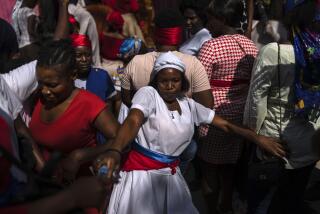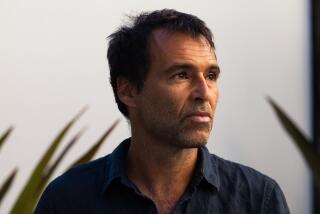Frenchman Honored in Afro-Brazil Cult : Voodoo: 88-year-old Parisian is a living legend to believers in Bahia. He is respected as the pre-eminent authority on merged cultures.
- Share via
SAO PAULO, Brazil — A blue-eyed Parisian has won renown in Brazil as an authority on the country’s African roots and as a high-ranking figure in candomble, the Brazilian variant of voodoo.
Pierre Verger, 88, born in the chic 16th arrondissement section of Paris, is Brazil’s only babalao, which in the candomble cult means “father of secrets.”
Verger was initiated as a babalao and given the name Fatumbi--”reborn through the grace of destiny”--in the early 1950s in what was then the African country Dahomey, now Benin.
Off and on Verger has spent 17 years in Africa, delving into candomble, but he has made his home in Brazil’s northeast state of Bahia, where the country’s African roots run deepest. There he is practically a living legend.
Verger’s career spans photojournalism, anthropology and history. But a thread running through his life for the last three decades and more is a deep love of Bahia.
He visited the Bahian capital, Salvador, for the first time in 1946 and, he said, what kept him there was the people.
“They are simple people who are proud in the good sense of pride,” said Verger, who opts for the simple life. His modest house in Salvador has no radio, no television and no telephone.
Verger has dozens of books to his credit, including one massive volume on the slave trade, and is respected as an eminent scholar on Afro-Brazilian culture.
More than four centuries of slave trading, mostly bringing manpower from Africa for sugar plantations, gave Brazil the biggest black population outside of Africa.
Yet Brazilians know little of Africa, and it has taken a Frenchman to help Brazilians realize their debt to the African continent.
On both sides of the Atlantic, here in Bahia and in Benin, some customs are still identical, Verger said.
A few years ago, he said, a group of Benin dancers visited Bahia and joined in a dance for the souls of the dead. There had been no direct contact between Bahia and Benin for more than 100 years, but the dancers from the two regions acted out the ceremony together in total harmony.
Verger sees African heritage manifesting itself in a variety of ways in Brazil.
He spent many years studying Yoruba, and he argues that the sing-song Bahian accent is a result of the melodious speech patterns brought by Yoruba-speaking slaves from West Africa.
More importantly, there is the prevalence of candomble, whose influence extends far beyond Bahia and seems to continue to grow among Brazilians of many backgrounds.
A study in the science magazine Ciencia Hoje said that in 1950 Sao Paulo had a single candomble terreiro , where fetishism is practiced. Today it has 3,000.
Verger says that black Brazilians do not have a monopoly on candomble and many whites also seek out candomble fortune tellers.
He contrasts the self-esteem of Brazilian blacks with what he describes as the aggressiveness of blacks in the United States, who he says have been historically cut off from their African religious roots.
Verger says that he does not have a religious bent. He sought out candomble, he says, to help understand Bahia and his initiation as a babalao was to gain access to Yoruba oral traditions.
“In Africa, it is the babalaos who orally transmit stories, legends and ballads. It is all very complex,” he explained.
The African sages, for example, taught him about traditional uses of vegetation, and he is busy today drawing up a catalogue of more than 3,000 plants with medicinal and magical uses.
The conventional part of Verger’s career was rather brief. Having earlier acquired some of the skills of a photographer, he joined the staff of London’s Daily Mirror in the mid-1930s.
After 15 days he quit but continued to work as a photographer. His assignments, many for Life magazine, included coverage of the exiled Russian revolutionary Leon Trotsky in Mexico and Chiang Kai-shek in China.
At 88, Verger is still wholly lucid and his conversation is spiced with a Gallic impishness.
One of his pet hates is air travel.
“You have no more space in a plane than a slave had in a slave ship,” Verger said. “And you have to pay for it.”
More to Read
Sign up for Essential California
The most important California stories and recommendations in your inbox every morning.
You may occasionally receive promotional content from the Los Angeles Times.












